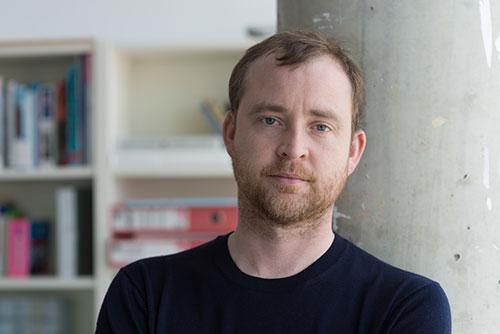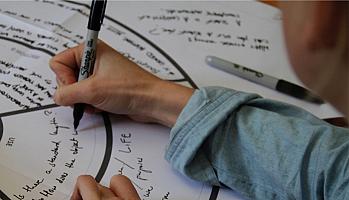MPhil/PhD
Design
Content navigation menu
Why study MPhil/PhD Design at Goldsmiths
Goldsmiths’ Department of Design postgraduate research programmes offer you the opportunity to redefine design research in a community of design practice.
- It is aimed at practitioners and scholars of design, and those in related disciplines, who wish to develop a theoretically engaged, critically aware and empirically informed approach to design, design education, design research and design practice.
- The programme builds on and contributes to the Department’s internationally renowned approaches to inventive, experimental, and creative research where design’s relation to the social is placed centre stage.
- You can choose to do a practice-based or a thesis-based research degree.
- There is research funding available that you may be eligible for – see below for more information.
Contact the department
If you have specific questions about the degree, contact Professor Alex Wilkie (programme convenor).
Length
2-4 years full-time or 4-8 years part-time
Fees
Home - full-time: £4786
Home - part-time: £2393
International - full-time: £17690
Department
You'll research
We offer the following pathways for your research degree.
Practice-based MPhil/PhD
The practice-based programme explores new approaches to, or applications of, existing knowledge by means of design practice.
For PhD, the research will create new knowledge by means of practice research. Your thesis will integrate an original body of practice and a written component providing critical analysis of your practice, critical assessment of relevant literature and practice and describe the method of research. Assessment is by thesis and viva voce. The word count will be as follows:
- MPhil includes a written component of between 20,000 and 30,000 words
- PhD includes a written component of between 30,000 and 60,000 words
Thesis-based MPhil/PhD
The thesis-based programme provides a written account of your research and contribution to knowledge on a subject related to design.
The MPhil thesis will provide a distinct contribute to the knowledge of a subject related to design and the PhD thesis will provide an original contribution to knowledge on a subject related to design. Both include a critical assessment of relevant literature and describe the method of research. Assessment is by thesis and viva voce. The word count will be as follows::
- MPhil has a written thesis of between 30,000 and 60,000 words
- PhD has a written thesis of between 60,000 and 100,000 words
A vibrant research community
At Goldsmiths you'll find a vibrant community of researchers, undertaking exciting multidisciplinary explorations. Recent PhD completions include:
- Empirical Speculation and Prototyping Futures in the Refugee Crisis
- The Housing Database Made Visible: Regenerative politics, participation and design
- Re-scripting Organisations: Inventing the designer-in-residence
- Care-politics in design: Towards an inventive feminist research practice
- Making Algorithms Public: Rendering visible the operations and politics of algorithmic systems
- Space for Boundary – Space as Place: An investigation into the design of architectural boundaries in residential mass housing, in the context of urban sustainability
- Re-doing Patient Experience Through Design-led Research: Considering the multiplicity and ontological politics of multiple sclerosis
- Designing the Future? How can speculation play a role in improving foresight for science and technology policymaking?
- Making Home: Agency, precarity and the internet of things
- Designing for Ambivalence: A designer’s exploration of the competing discourses offered by smartphones to mothers and their young children
- Controlled Prototyping Environments: Reconceptualising location through participatory and embodied design practice
- What's Happening? Explorations in the strategising and unfolding of free-form design events
Fees and funding
Annual tuition fees
These are the PG fees for students starting their programme in the 2024/2025 academic year.
- Home - full-time: £4786
- Home - part-time: £2393
- International - full-time: £17690
If your fees are not listed here, please check our postgraduate fees guidance or contact the Fees Office, who can also advise you about how to pay your fees.
It’s not currently possible for international students to study part-time under a student visa. If you think you might be eligible to study part-time while being on another visa type, please contact our Admissions Team for more information.
If you are looking to pay your fees please see our guide to making a payment.
Funding opportunities
CHASE (Consortium for the Humanities and the Arts Southeast England)
Goldsmiths is one of nine leading research institutions that are part of CHASE.
CHASE funds more than 56 studentships per year. These studentships cover:
- Tuition fees each year (this is currently £4,327 per year for full-time study)
- A maintenance grant each year (this is currently £17,009 per year for full-time study; including London weighting)
- Funding for research training
For more information about applying for AHRC studentships, please visit the CHASE website, and be sure to check guidelines and deadlines for prospective students.
ESRC/SENSS Doctoral Studentships
Fully-funded ESRC studentships are available to research students via this Doctoral Training Partnership (DTP). Find out about the ESRC/SENSS Doctoral Studentships.
Goldsmiths scholarships and studentships
Explore the Goldsmiths scholarships finder to find out what funding you may be eligible for.
Paying your fees
Find out about paying your tuition fees.
Additional costs
In addition to your tuition fees, you'll be responsible for any additional costs associated with your course, such as buying stationery and paying for photocopying. You can find out more about what you need to budget for on our study costs page.
There may also be specific additional costs associated with your programme. This can include things like paying for field trips or specialist materials for your assignments.
Entry requirements
You should normally have (or expect to be awared) the following qualifications:
- A good 2:1 or 1st class honours degree
- A taught Masters in a relevant subject area
You might also be considered for some programmes if you aren’t a graduate or your degree is in an unrelated field, but have relevant experience and can show that you have the ability to work at postgraduate level.
International qualifications
We accept a wide range of international qualifications. Find out more about the qualifications we accept from around the world.
If English isn’t your first language, you will need an IELTS score (or equivalent English language qualification) of 7.0 with a 7.0 in writing and no element lower than 6.5 to study this programme. If you need assistance with your English language, we offer a range of courses that can help prepare you for postgraduate study.
How to apply
You apply directly to Goldsmiths using our online application system.
Before submitting your application you'll need to have:
- Details of your education history, including the dates of all exams/assessments
- The email address of your referee who we can request a reference from, or alternatively an electronic copy of your academic reference
- Contact details of a second referee
- A personal statement – this can either be uploaded as a Word Document or PDF, or completed online
- A visual portfolio if relevant – see below for details
- Details of your research proposal
- If available, an electronic copy of your educational transcript (this is particularly important if you have studied outside of the UK, but isn’t mandatory)
You'll be able to save your progress at any point and return to your application by logging in using your username/email and password.
Before you apply for a research programme, we advise you to get in touch with the programme contact, listed above. It may also be possible to arrange an advisory meeting.
Before you start at Goldsmiths, the actual topic of your research has to be agreed with your proposed supervisor, who will be a member of staff active in your general field of research. The choice of topic may be influenced by the current research in the department or the requirements of an external funding body.
If you wish to study on a part-time basis, you should also indicate how many hours a week you intend to devote to research, whether this will be at evenings or weekends, and for how many hours each day.
Visual portfolio
For the purpose of the initial application it is recommended that you prepare a portfolio of material documenting your previous work. We typically ask for a 10-page annotated portfolio in the form of a PDF file, which you can upload when you apply.
Research proposal
The proposal should be between 1,500 and 3,000 words in length (not including references). The key consideration in drafting the proposal should be clarity.
Your research proposal should be organised using the following headings:
- Title: be concise and explicit
- Introduction: introduce the questions and issues central to your research / identify the field of study in broad terms / indicate how you expect your research to contribute to the field
- Research background and questions: expand on your introduction – look at key sources, texts and approaches in the field / consider how your proposal differs from and contributes to existing work / consider how it extends our understanding of particular questions or topics / also briefly indicate how your previous studies, professional and/or other experience contributes to your understanding of the field and your preparedness for undertaking research training
- Research design: outline the methodology you will employ / consider resources and facilities needed / forms of analysis
- Schedule of work: outline how you plan to complete the project within the period of the award – this could include a timetable for researching and writing
- References: a list of works cited in your proposal, such as: books, journal articles, websites and prior art and design
For more detailed information, contact the Design department by email: design@gold.ac.uk
The level of detail required under each heading will depend on the specific project. The key requirement is that the proposal communicates a clear programme of enquiry and investigation. It should demonstrate that you are capable of framing your own agenda for research and that you have a sense of the larger field to which you wish to make a creative and critical contribution.
Supervisors
An initial suggestion of who you think might be an appropriate supervisor for your research is useful both for directing your application to appropriate members of staff and in determining a good match between your research and the Department. Please see the description of Design staff research interests for details.
When to apply
You can make an application to study for an MPhil or PhD with us at any time of the year, for the academic year starting the following October.
We encourage you to complete your application as early as possible, even if you haven't finished your current programme of study. It's very common to be offered a place conditional on you achieving a particular qualification.
If you're applying for external funding from one of the Research Councils, make sure you submit your application by the deadline they've specified.
Selection process
Admission to many programmes is by interview, unless you live outside the UK. Occasionally we'll make candidates an offer of a place on the basis of their application and qualifications alone.
Find out more about applying.




